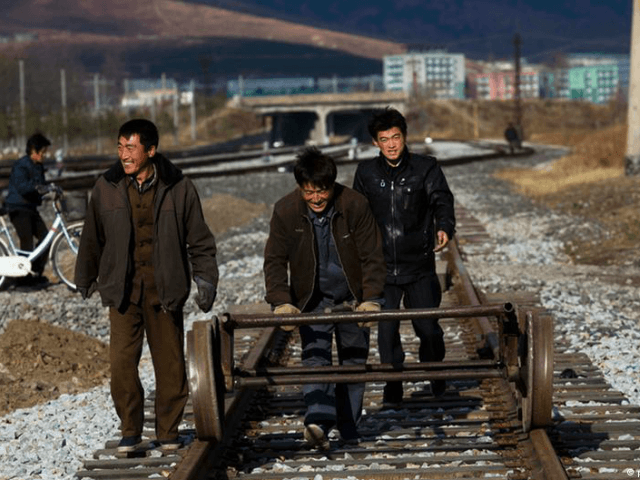A report from Japan’s Asia Press International (API) identifies “massive amounts” of Russian oil entering North Korea, providing a much-needed lifeline as the rest of the world pressures the rogue regime for its consistent nuclear threats with growing sanctions.
Deutsche Welle reports that API discovered, through “citizen journalists” in North Korea, that the price of diesel oil fell by 60 percent between early November and early December, and gasoline saw a 25 percent drop in prices. The drop suggests that the supply of oil within North Korea has increased despite the tremendous pressure from United Nations member states to damage the North Korean economy, including sanctions that have limited Pyongyang’s access to coal, food imports, and other key goods.
The United Nations has notably failed in imposing any significant oil sanctions on North Korea, though it has targed fuel generally as a commodity to rein in. President Donald Trump urged Chinese counterpart Xi Jinping to cut North Korea’s Chinese oil supply after the communist dictatorship tested what it claimed to be an intercontinental ballistic missile (ICBM) last week, according to American Ambassador to the U.N. Nikki Haley.
API argues it is not China, but Russia that has contributed to the reported drop in oil prices within North Korea. Its report claims that “massive amounts” of Russian oil are appearing in North Korea’s market.
Deutsche Welle cites experts in the field who note that it is difficult to have any concrete facts regarding the North Korean economy due to the rogue regime’s total control over its markets and secrecy regarding daily life within its borders. James Brown, an associate professor of international relations and an expert on Russia-North Korean trade at the Tokyo campus of Temple University, told the outlet that, even with that caveat, “it does appear that Russia has recently been supplying Pyongyang with fuel.”
The report follows statements from Russian officials suggesting that Moscow should play a greater role in encouraging North Korea to abandon its nuclear program.
“We have channels, through which we are conducting a dialogue, and we are ready to deploy them, we are ready to exert our influence on North Korea,” Russian Deputy Foreign Minister Igor Morgulov told reporters on Tuesday, according to Reuters. “We believe that the isolation alone … will not work, this won’t take us forward. By doing this, we will only worsen the situation, which is dangerous. We are really on the brink of a real war.”
Russia’s state-run online outlet Sputnik claimed last week that North Korea’s communist leaders are “ready to hold talks to solve the nuclear crisis without the recognition of its nuclear power status as a pre-condition for the talks.” Conveniently, Russian officials told Sputnik that Kim and his cohort “obviously mistrust everyone, except for Russia.”
The implication that North Korea does not trust its largest ally and trading partner, China, may serve to irk Beijing as much as Washington. Chinese leader Xi Jinping has met and discussed North Korea via telephone on multiple occasions with American President Donald Trump, who has urged China to take a larger role in restraining the Kim regime. China has implemented United Nations sanctions and its state media has dismissed Kim’s as “the most insecure country in the world.” North Korea, in turn, has accused China in its state media of “dancing to the tune of the U.S.”
President Trump has stated that he believes China is helping on the North Korea issue, though not enough, and Russia has hindered any attempts to defuse the crisis. “China is helping us and maybe Russia’s going through the other way and hurting what we’re getting,” Trump said in October. “We have to solve the North Korea problem. It’s a very big problem. It should never have been given to me. This should have been solved long before I came into office when it would have been easier to solve.”
Russia appears to be taking advantage of the overt tensions to curry more favor with North Korea. This month, Russia began providing North Korea with internet service, the second nation after China to do so. Russia’s government has repeatedly criticized America for warning North Korea to halt its nuclear testing and incessant threats to use nuclear weapons.
Russia has also condemned calls for further sanctions, with Russian President Vladimir Putin himself stating in September that sanctions “would now be useless and ineffective” because North Korea’s government “will eat grass but they will not turn away from the path that will provide for their security.”

COMMENTS
Please let us know if you're having issues with commenting.